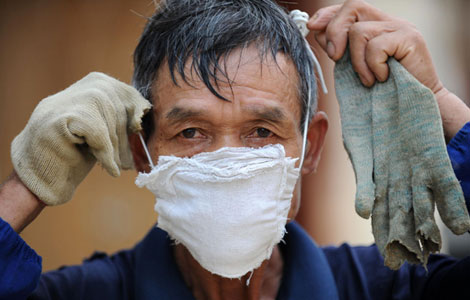 |
|
|
|
|||||||||||
Despite enduring a tough trade situation with developed economies such as Japan and Europe, China's trade with Russia has enjoyed robust growth, data shows.
In the first quarter of this year, trade between the two countries grew by 33 percent, hitting $21.49 billion, according to Chinese customs statistics.
By comparison, trade with the European Union grew by just 2.6 percent year-on-year, while trade with Japan fell by 1.6 percent.
Last year, trade volume between China and Russia reached a total of $79.2 billion, a 42.7 percent increase year-on-year.
China is already Russia's main source for imports, while Russia is China's eighth-largest trading partner.
Analysts say Vice-Premier Li Keqiang's visit to the country will add fresh momentum to the fast-growing economic link.
During the visit, enterprises and government departments from both sides were expected to sign cooperation agreements covering trade, energy, science and technology, finance, communications and other fields.
Those involving energy and science and technology deserve special attention, said Liu Junmei, an expert in Sino-Russian relations at Fudan University, because energy already accounts for a large proportion of Russia's exports to China, while China wants more high-tech exports from Russia.
In addition to trade ties, the two countries will strengthen mutually beneficial cooperation in investment, deep processing, joint production, high technology and large strategic projects, Deputy Foreign Minister Cheng Guoping said at a news conference last Monday.
However, underlying the rapid growth is a structural imbalance, which has long been a complaint for both nations, especially Russia.
China exports mainly mechanical and electrical products, high-tech products, and textiles to Russia, while energy and raw materials go the other way. Russia has long sought to reduce the export share made up by energy and boost the export of manufactured goods.
With this in mind, Cheng said both sides should take "prudent and pragmatic" steps to address the imbalance.
"Our attitude is clear, which is, our market is open," said Liu at Fudan University. "We're willing to buy as long as your products are competitive.
"We hope Russia understands that trade based on comparative advantages serve both countries' interests."
Russia has gradually reduced its reliance on Chinese imports, while China's appetite for energy and raw materials have led to an increase in imports from Russia.
This is clearly reflected in the latest Chinese customs statistics, which showed that in the first quarter of this year, Russia's imports from China fell 2.9 percent, while its exports to China increased 49.2 percent.
"To achieve rapid economic growth, China needs Russia's energy and raw materials, so this trend will undoubtedly continue," Liu added.
By 2020, trade volume between the two countries should reach at least $200 billion, according to the goal set by Chinese and Russian leaders last year.
Contact the writer at zhengyangpeng@chinadaily.com.cn

|

|

|

|

|

|